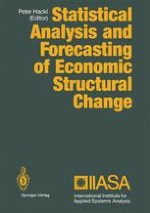1989 | OriginalPaper | Buchkapitel
Investment, Taxation, and Econometric Policy Evaluation: Some Evidence on the Lucas Critique
verfasst von : Jean-Marie Dufour
Erschienen in: Statistical Analysis and Forecasting of Economic Structural Change
Verlag: Springer Berlin Heidelberg
Enthalten in: Professional Book Archive
Aktivieren Sie unsere intelligente Suche, um passende Fachinhalte oder Patente zu finden.
Wählen Sie Textabschnitte aus um mit Künstlicher Intelligenz passenden Patente zu finden. powered by
Markieren Sie Textabschnitte, um KI-gestützt weitere passende Inhalte zu finden. powered by
The aggregate investment schedule may be used to study the impact of various policy measures, such as changes in corporate tax rates, depreciation allowances, and investment tax credits. Its parameters should be invariant with respect to the policy changes themselves, a point forcefully stressed by Lucas (1976). On the impact of investment tax credits, Lucas makes two predictions: first, if the model is implemented under an assumption of static expectations (versus rational expectations) and estimated from a period during which policy rules changed appreciably, it will exhibit parameter instability; second, the impact of tax credits is likely to be heavily underestimated. This chapter presents empirical evidence on both these effects by studying a version of the Hall-Jorgenson model estimated from US data (1956–1972). For this purpose, we use recursive stability analysis, an exploratory methodology that makes very weak assumptions on the form of the instability to be detected and provides indications on the direction of prediction errors. The main finding is a discontinuity associated with the first imposition of the tax credit (1964–1966); further, this shift led to underprediction of investment. The results thus support Lucas’s hypothesis.
